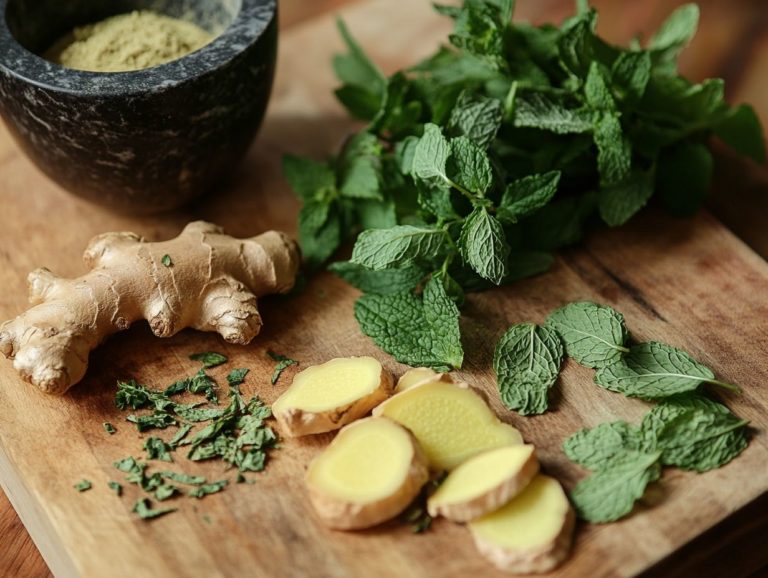Herbal Remedies for Relieving Constipation
Constipation is frustrating and uncomfortable. It impacts your daily life and well-being. Understanding its causes and symptoms is crucial for achieving effective relief. Many people turn to natural remedies to help relieve constipation.
This article delves into a range of herbal remedies that act as natural laxatives and stool softeners. You’ll also find herbs that enhance digestion and encourage healthy bowel movements. Discover how to use these remedies safely and learn about potential side effects. Additionally, make lifestyle changes, including incorporating foods like apples, pears, and high-fiber options that can help alleviate constipation.
Exploring these natural solutions, like lemon juice and olive oil, can empower you to take charge of your digestive health!
Contents
- Key Takeaways:
- Understanding Constipation
- Herbal Remedies for Constipation
- How to Use Herbal Remedies for Constipation
- Potential Side Effects and Precautions
- Other Natural Ways to Relieve Constipation
- Frequently Asked Questions
- What are some common herbal remedies for relieving constipation and promoting healthy bowel movements?
- How do these herbal remedies work to relieve constipation?
- Are there any potential side effects of using herbal remedies for relieving constipation?
- Can pregnant women use herbal remedies for constipation relief?
- Are there any dietary or lifestyle changes that can complement the use of herbal remedies for relieving constipation?
- How long does it usually take for herbal remedies for constipation to work?
Key Takeaways:
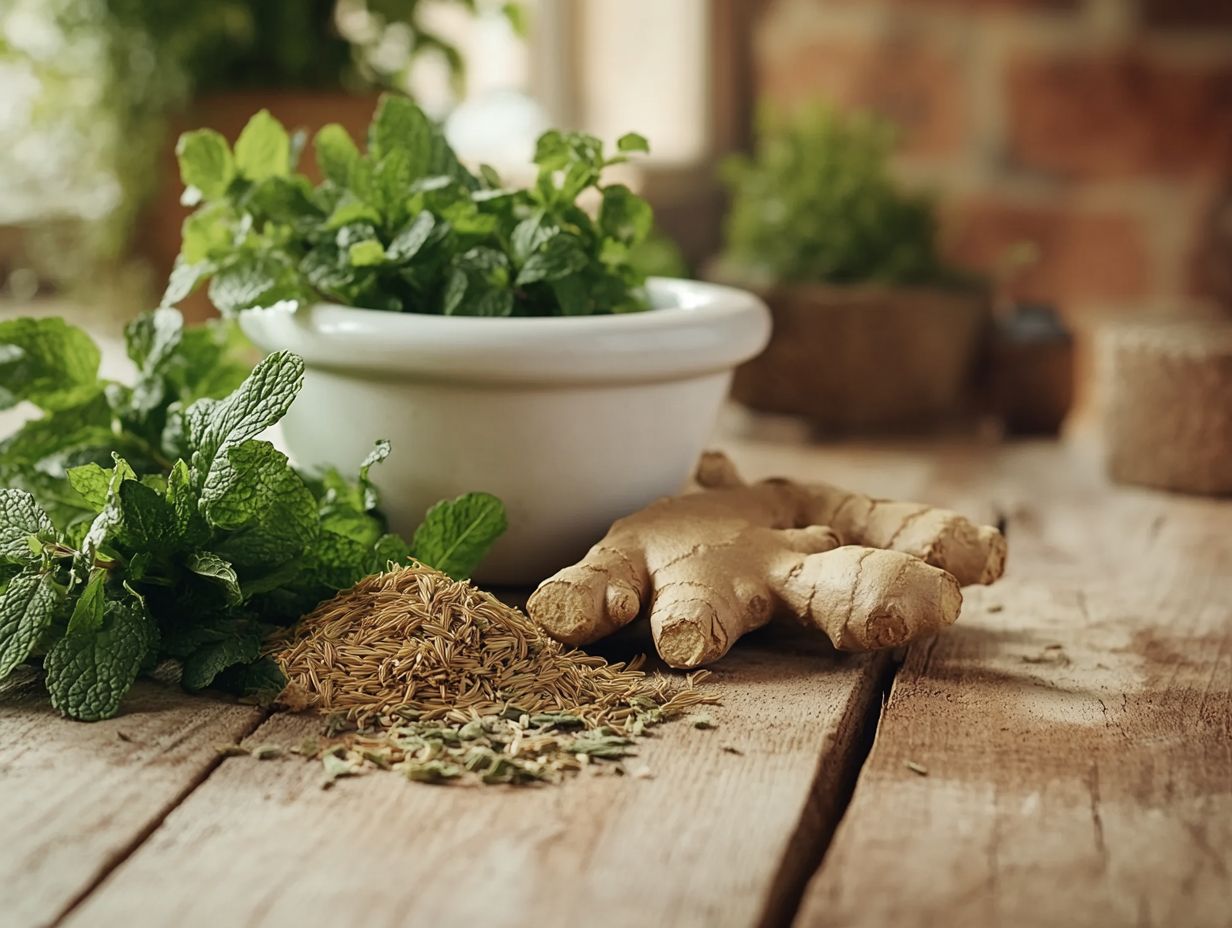
- Natural laxatives like flaxseed and senna can relieve constipation.
- Herbs such as ginger and peppermint promote digestion and bowel movements.
- Follow proper dosages when using remedies like psyllium and prune juice to avoid side effects.
Understanding Constipation
Millions of people experience constipation. It s a common digestive health issue. It often appears as infrequent bowel movements, difficulty in passing stools, and abdominal pain. The causes are various, ranging from dietary habits and dehydration to lifestyle choices and underlying medical conditions. Understanding constipation is essential for effective management.
Fortunately, many natural remedies, including probiotics like yogurt and kefir good bacteria that help digestion can provide relief. You can combat this issue by making dietary changes, engaging in regular exercise, and incorporating specific high-fiber foods such as kiwis and blackberries into your meals.
This comprehensive guide will cover the fundamental aspects of constipation, outlining its causes and symptoms. It will also present effective natural remedies to help you achieve regular bowel movements and enhance your overall digestive health.
Causes and Symptoms
The causes of constipation can stem from various factors. These include insufficient dietary fiber and hydration, a sedentary lifestyle, and specific medical conditions.
Inadequate fiber intake especially from fruits, vegetables, and whole grains can significantly disrupt your regular bowel movements. This leads to discomfort and irregularity. When your hydration levels dip, your body absorbs more water from the stool. This results in harder and drier feces that become challenging to pass. A lack of physical activity slows down your digestive processes, worsening the issue.
Watch for symptoms like infrequent bowel movements or straining during stool passage. A persistent feeling of fullness is also a sign. Early recognition helps you manage constipation effectively. You can do this through dietary adjustments, increasing your fluid intake, or incorporating more physical activity into your daily routine.
Herbal Remedies for Constipation
Herbal remedies can significantly enhance your approach to constipation relief. They leverage the capabilities of natural laxatives to foster healthy bowel movements and elevate your digestive health. Explore these natural remedies to improve your digestive health! Discover how easy it is to incorporate them into your routine.
Natural Laxatives and Stool Softeners
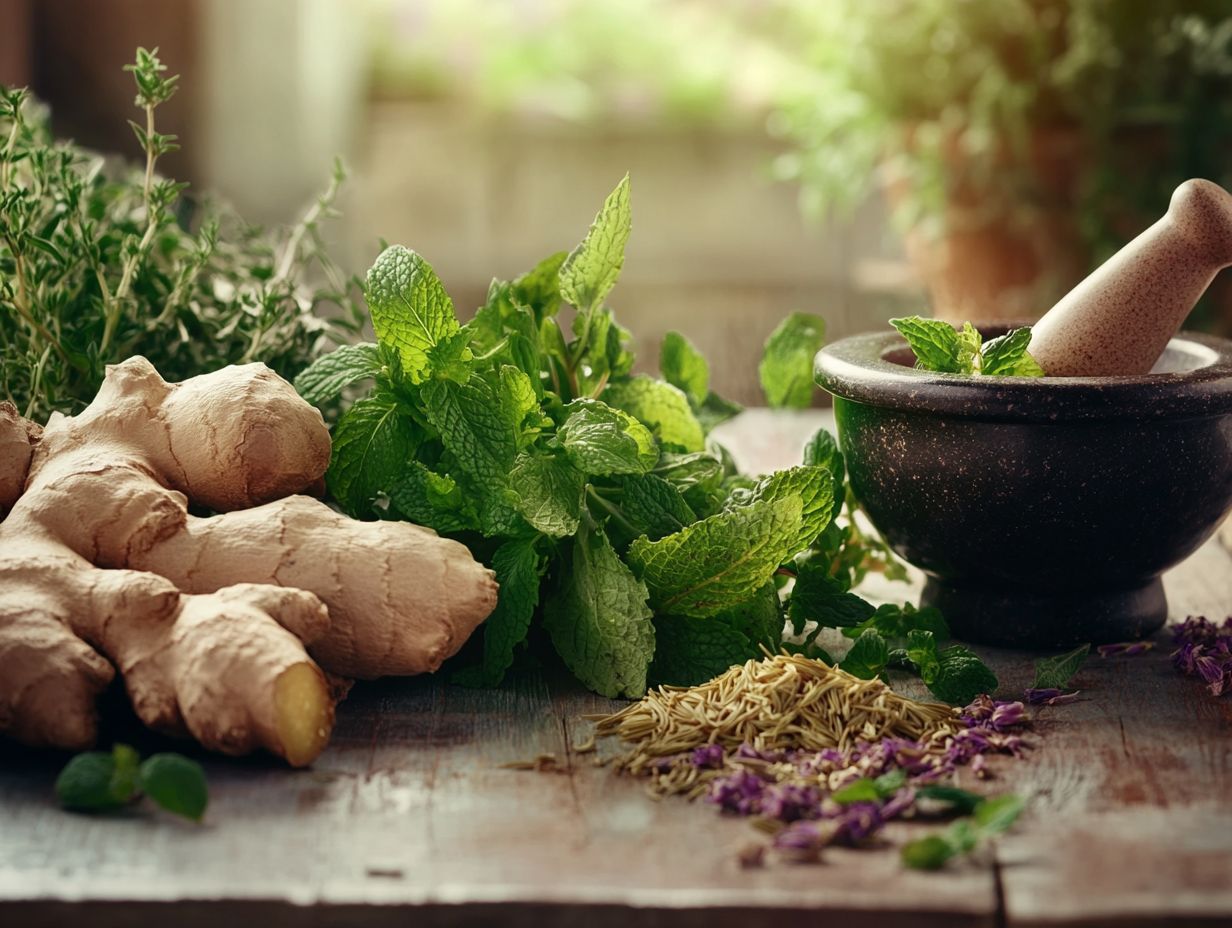
Ready to feel better? Natural laxatives can help! Options like psyllium, prune juice, and magnesium citrate offer effective alternatives for relieving constipation without resorting to synthetic medications.
These natural options enhance intestinal movement or add moisture to your stool, making it much easier to pass! For example, psyllium is a type of fiber that helps bulk up your stool. This makes it easier for your body to eliminate waste while nurturing beneficial gut bacteria. Exploring herbal solutions for IBS management can lead to better digestive health overall.
Incorporating prune juice into your morning routine can significantly enhance your hydration levels and stimulate bowel movements. This is thanks to its naturally occurring sorbitol. Magnesium citrate draws water into your intestines. It is often taken before bed for a gentle overnight effect.
By exploring these natural options, you ll discover a balanced approach to managing your digestive wellness.
Herbs for Promoting Digestion and Bowel Movements
Certain herbs, like ginger and fennel, can be your natural allies in promoting digestion and stimulating bowel movements. They effectively combat constipation.
These powerful plants not only offer relief but also enhance your overall digestive health. They soothe your stomach and reduce bloating. You can easily integrate ginger into your meals by adding fresh slices to stir-fries or grating it into marinades. On a chilly day, a warm ginger tea can provide comforting relief.
Fennel seeds, celebrated for their carminative properties, can be sprinkled into salads or brewed as a flavorful tea. This helps alleviate gas and promotes a healthier gut. By incorporating these herbs for treating digestive discomfort into your daily meals, you can create a delicious and beneficial approach to digestion.
How to Use Herbal Remedies for Constipation
Utilizing herbal remedies for constipation, such as stimulant laxatives like senna or laxatives that draw water into the intestines, demands a keen understanding of the appropriate dosage and preparation methods. This knowledge is essential to fully harness their benefits while ensuring your safety.
Proper Dosage and Preparation Methods
Proper dosage and preparation methods are essential to ensure that herbal laxatives are both effective and safe for relieving constipation.
Understanding the recommended dosages, especially for laxatives that draw water into the intestines, can significantly enhance the overall effectiveness of these natural remedies. For instance, if you’re considering senna as a laxative, start with a low dose, typically around 10-15 mg, taken once a day. If you’re interested in exploring more about herbal remedies for digestive issues, remember to follow up with adequate hydration, as fluids play a crucial role in facilitating the laxative’s action.
When using psyllium husk, known for its bulking properties, mix one tablespoon with 8 oz. of water to optimize its results. To further boost the effectiveness of these herbal options, consider exploring DIY herbal remedies for digestive health and incorporating prebiotic foods into your diet; they provide additional support for your digestive health. A thoughtful approach to dosage and preparation will lead to a smoother experience overall.
Potential Side Effects and Precautions
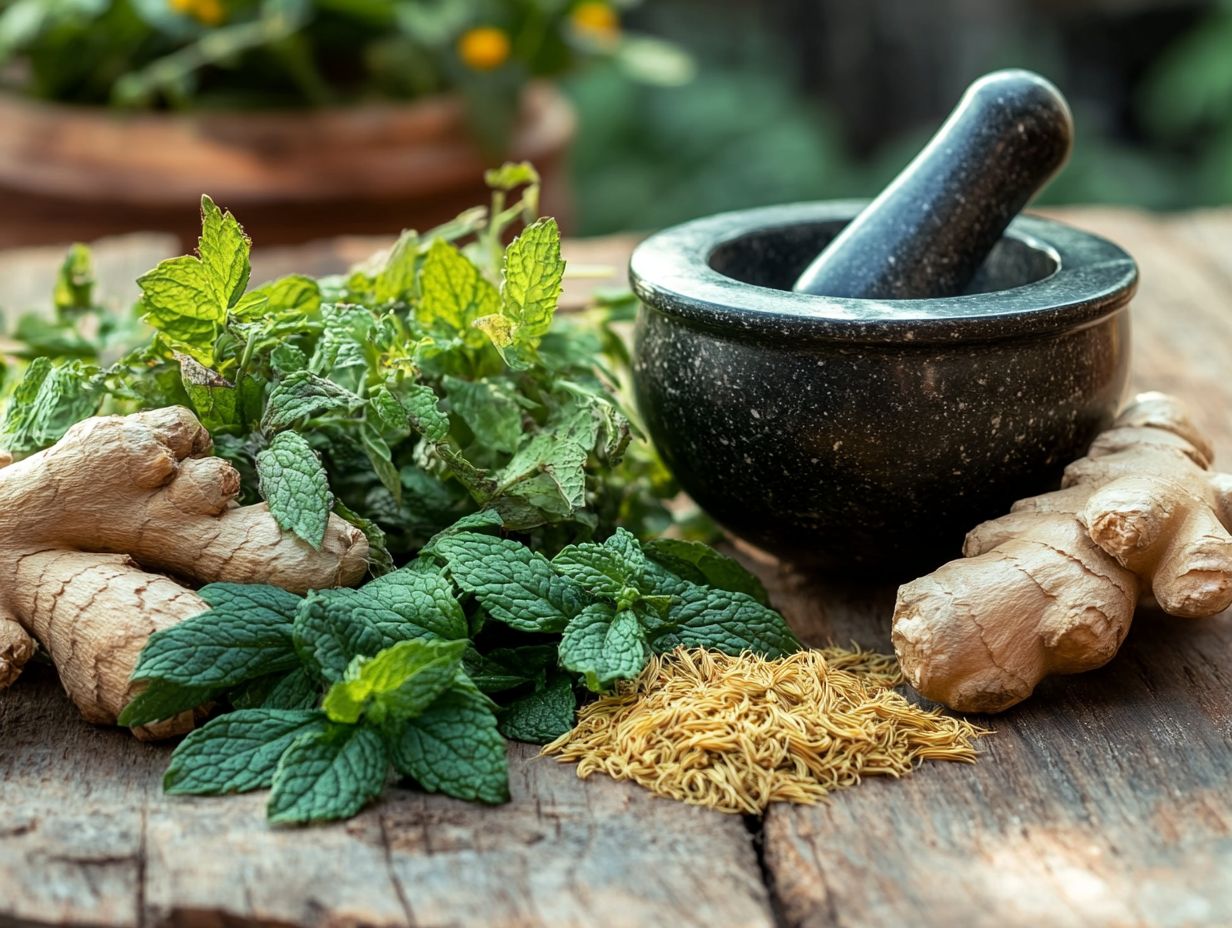
While herbal remedies may offer effective relief for constipation, it’s crucial to remain mindful of potential side effects and interactions. This awareness can help you prevent any adverse reactions and ensure a safer approach to your well-being.
Don t wait to feel your best! Explore these remedies today, and remember to consult a healthcare provider for personalized advice regarding herbal remedies.
Possible Risks and Interactions
When considering herbal remedies for constipation, it s crucial to acknowledge the potential risks and interactions that may arise. Careful thought and a conversation with your healthcare provider are essential.
Some herbal laxatives can interact negatively with prescription medications, leading to undesirable side effects or reducing the effectiveness of your treatments. If you have pre-existing health conditions like diabetes, heart disease, or gastrointestinal disorders, the stakes can be higher due to altered absorption rates or electrolyte imbalances. It’s important to explore herbal remedies for caring for your gut, as the herbal ingredients in these laxatives can behave unpredictably when mixed with over-the-counter medications and supplements.
If you’re thinking about incorporating these herbal options into your routine, especially if you have lactose intolerance or other health issues, seeking professional guidance is a must. This ensures that your choices are safe and tailored to your unique health profile.
Other Natural Ways to Relieve Constipation
Beyond herbal remedies, there are many natural options to alleviate constipation, such as clear soups and sparkling water. Consider making dietary adjustments, boosting your hydration levels, and incorporating regular exercise into your routine.
Adding omega-3 oil and pulses to your diet can also promote digestive health and enhance your overall well-being.
Dietary Changes and Lifestyle Tips
Incorporating dietary changes can significantly improve your bowel movements and relieve constipation. Boost your intake of high-fiber foods and enhance your hydration.
A diet rich in fruits, vegetables, whole grains, and legumes ensures you receive plenty of both soluble and insoluble fiber, promoting regularity and supporting digestive health. Foods like oats, beans, apples, and carrots nourish your body and foster a healthy gut.
Maintaining adequate hydration is equally important; drinking enough water helps soften stool and promotes efficient digestive processes.
Engaging in regular physical activity whether it s a brisk walk or a calming yoga session can stimulate intestinal function, reducing the likelihood of discomfort associated with constipation. By blending these dietary adjustments with an active lifestyle, you can enhance your overall digestive well-being.
Frequently Asked Questions
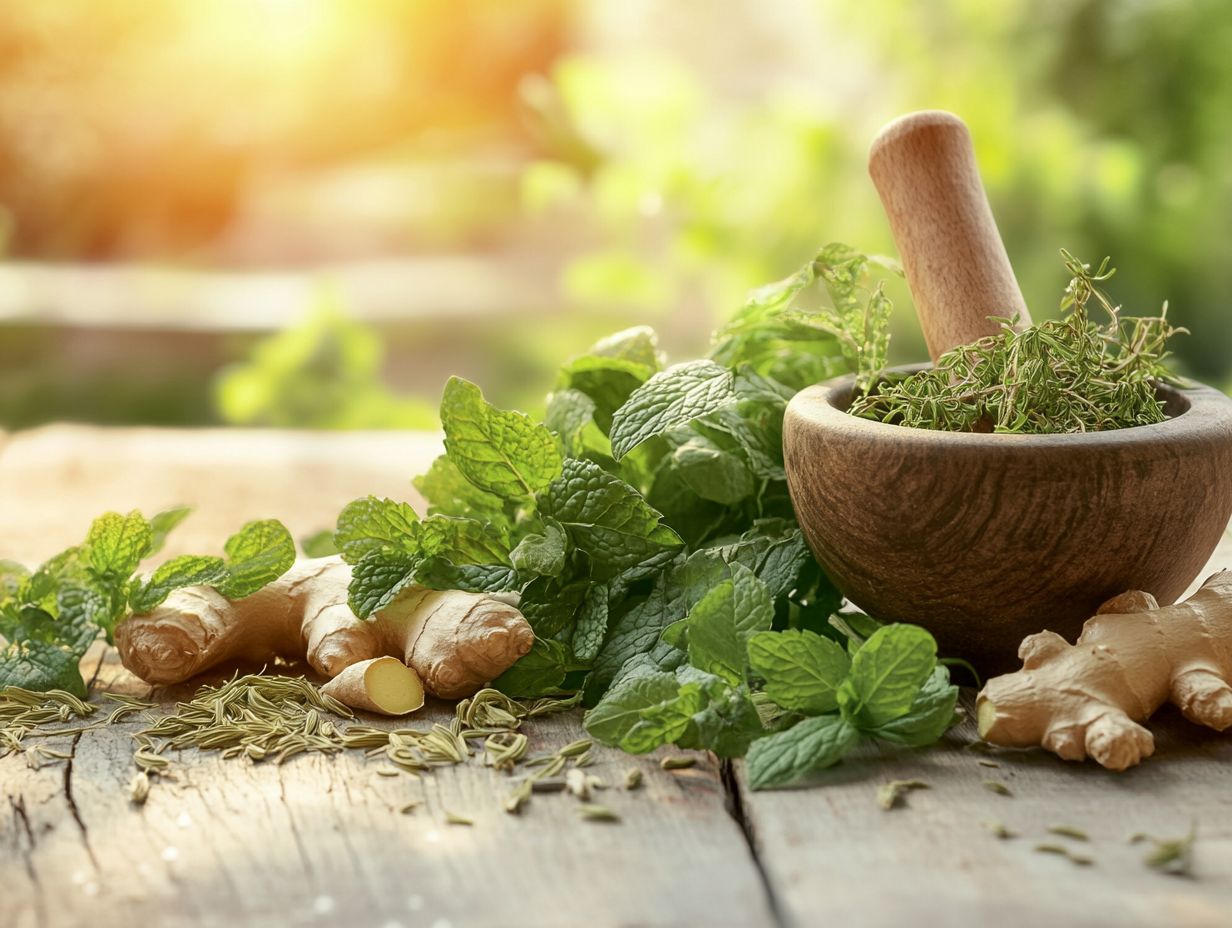
What are some common herbal remedies for relieving constipation and promoting healthy bowel movements?
Some common herbal remedies include aloe vera, senna, cascara sagrada, prune juice, and rhubarb.
How do these herbal remedies work to relieve constipation?
These remedies work by stimulating the muscles in the digestive tract to help move stool through the colon and promote muscle movements that assist in stool passage. They also increase the amount of water in the stool, making it easier to pass.
Are there any potential side effects of using herbal remedies for relieving constipation?
Yes, some herbal remedies may cause abdominal cramping, bloating, or diarrhea. Be sure to follow the suggested dosages and consult with a healthcare professional before trying any herbal remedy.
Can pregnant women use herbal remedies for constipation relief?
Pregnant women should always consult with their healthcare provider before using any herbal or natural remedies for constipation relief, as some may not be safe during pregnancy.
Are there any dietary or lifestyle changes that can complement the use of herbal remedies for relieving constipation?
Yes, drinking plenty of water including sparkling water eating a high-fiber diet rich in fruits like apples, pears, and raspberries, and staying physically active can all help prevent and relieve constipation.
How long does it usually take for herbal remedies for constipation to work?
The effectiveness and timing of herbal remedies may vary from person to person. Some may experience relief within a few hours, while others may take a few days. It is essential to follow the recommended dosages and continue making dietary and lifestyle changes for long-term relief.






